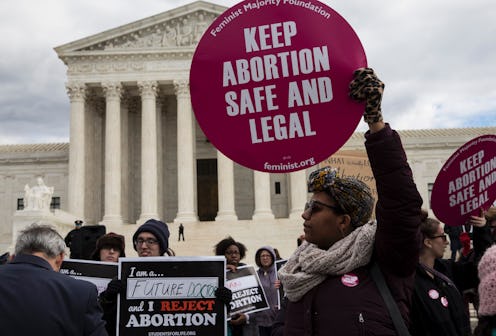News
Republicans Want To Ban Abortion Before You Even Realize You’re Pregnant

On Wednesday, House Republicans announced that in a week's time on Nov. 1, they'll hold the first hearing a bill that would ban abortions after six weeks at the federal level, with no exceptions for rape or incest. The legislation is sponsored by Rep. Steve King, and if it becomes law, physicians who perform abortions after fetal cardiac activity is detected — generally around six weeks into a pregnancy — would be eligible for a five-year prison term.
The bill in question, H.R. 490, was first introduced back in January, but for months, no hearings for it had been scheduled. That changed on Wednesday, when the House Judiciary Committee announced that on Nov. 1, the Subcommittee on the Constitution and Civil Justice will be holding a hearing on H.R. 490, also known as the "Heartbeat Protection Act."
“Since Roe v. Wade was unconstitutionally decided in 1973, nearly 60 million innocent babies' lives have been ended by the abortion industry, all with a rubber stamp by the federal government,” King said in a January press release announcing the bill. “My legislation will require all physicians, before conducting an abortion, to detect the heartbeat of the unborn child. If a heartbeat is detected, the baby is protected."
Although many people use the phrase "fetal heartbeat" in reference to this type of legislation, some physicians have argued that the term "fetal heartbeat" is misleading: While fetuses do exhibit cardiac activity at six weeks, this happens in something called the fetal pole, a millimeters-thick part of a fetus that bears little resemblance to a human heart, despite the colloquial use of the term "fetal heartbeat" to refer to it.
Pro-choice groups thoroughly denounced the legislation.
"It's just simply outrageous that [Republicans] would look to ban abortion at all," a representative from Planned Parenthood tells Bustle, noting that House Republicans passed a bill earlier in October banning abortions after 20 weeks. "It's legal in this country, it's a protected right, and it should remain that way."
In all likelihood, H.R. 490 will not become law. Republicans might have enough votes in the House of Representatives to pass the bill, but the legislation would need 60 votes to clear a Democratic filibuster in the Senate. Republicans only hold 52 Senate seats, and the odds of eight Democrats breaking ranks on a draconian anti-abortion bill like this are approximately zero. Unless Republican leadership changes Senate filibuster rules for legislation — something Majority Leader Mitch McConnell has consistently refused to do — it's hard to see how this bill ends up on President Trump's desk.
The Heartbeat Protection Act would ban physicians from aborting fetuses with detectable cardiac activity and, likewise, prohibit abortion doctors from performing abortions without first measuring whether or not a fetus exhibits such activity. The only exceptions would be in cases where the mother's life would be endangered by giving birth, but even that has caveats: The bill specifies that women would be allowed to have abortions after six weeks only if their lives were endangered by a "physical" condition — "but not psychological or emotional" conditions.
Fetal cardiac activity is detectable at around six weeks into a pregnancy. Although many women learn that they're pregnant as soon as three or four weeks after conception, it's not uncommon for this process to take six, seven, or eight weeks; if the Heartbeat Protection Act became law, women whose pregnancies take over six weeks to manifest would be effectively banned from having abortions. Similarly, women who learn of their pregnancies five weeks after conception would have only a one-week window in which to obtain an abortion, which is likely unfeasible for the women who, for example, live in one of the seven U.S. states with only one abortion clinic.
Bills similar to this one have been introduced in various state legislatures over the last several years; however, all of them either didn't pass the state houses, were vetoed by the state's governor or were ultimately struck down by courts.